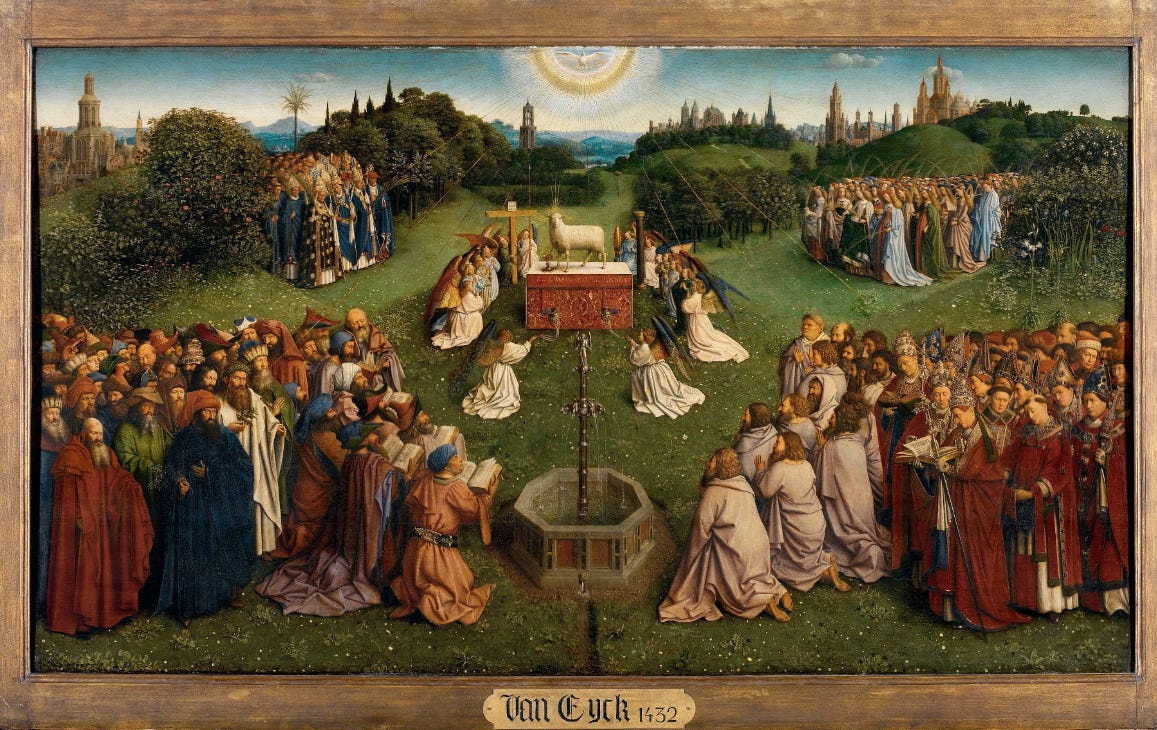Daily Readings | 18 March 25 | The Doxology of Jude (24–25)
Scripture Readings: Gen 7:1–15; Prov 8:32–9:11
Saint/Feast Day: St. Cyril of Jerusalem, archbishop
In 381 he attended the Second Ecumenical Council at Constantinople which condemned afresh the Arian heresy, especially as regards the Divinity of the Holy Spirit. He died in peace in 386. He is best remembered for the baptismal sermons he gave, his ‘Mystagogic Catecheses.’
L. Farley, Eastern Saints.
Readings: Gen 7:1–15; Prov 8:32–9:11
After vacationing and getting a pinch of food poisoning, I am able to now finish up our discussion of Jude, which will be rather short since it is only the doxology and end of the epistle.
|24| Now to him who is able to keep you from falling and to present you without blemish before the presence of his glory with rejoicing, |25| to the only God, our Savior through Jesus Christ our Lord, be glory, majesty, dominion, and authority, before all time and now and for ever. Amen.
The previous exhortation from Jude concerned saving others from the eternal fires while also not being corrupted in the process— “on some have mercy with fear, hating even the garment spotted by the flesh.”
Jude then concludes with a doxology, giving praise to God, while also reassuring the community that he will not allow them to fall away. By not falling away, they are then to be presented “in the presence of [God’s] glory,” but “without blemish” (ἀμώμους).
This term, “without blemish” (ἀμώμους), appears 83 times in the Septuagint (LXX) and 8 times in the New Testament, Eph 1:4, 5:27; Phil 2:15; Col 1:22; Heb 9:14; 1 Peter 1:19; Jude 24; Rev 14:5.
Many of the instances in the NT apply to Jesus as a blameless sacrificial victim, but there are other instances—as in Jude—where the believer is offered up.
As R. Bauckham, 2 Peter, Jude, 122 comments,
Of these, Jude 24; 1 Thess 3:13; Eph 5:27; and Col 1:22 are eschatological in reference, and all of them use the sacrificial metaphor; Christians are to be presented before God as sacrificial victims without blemish.
This idea is underscored by the use of ἄμωμος in the LXX—the sacrificial victims are supposed to be “without blemish,” e.g., Exod 29:1; Lev 1:3; Numb 6:14; Ezek 43:22.
When used in relation to Christ, this makes good sense: he who has no sin, a spotless sacrifice without blemish:
how much more shall the blood of Christ, who through the eternal Spirit offered himself without blemish to God, purify your conscience from dead works to serve the living God. (Heb 9:14)
but with the precious blood of Christ, like that of a lamb without blemish or spot. (1 Peter 1:19)
But, what does that mean for the Christian to be presented before God’s glory without blemish?
Are we to read this as meaning that the Christian should be without sin when we approach God? If so, how is that achieved? Jude does not give us an explanation in this doxology, but is the assumption that Jesus’ sacrifice is sufficient?
Or, is this a potential parallel with 1 John 5:18—as I have briefly reflected on—and its perfectionist position:
We know that any one born of God does not sin, but He who was born of God keeps him, and the evil one does not touch him.
Based on the grammar, it appears that the former may be in mind. The doxology begins with a statement of what God is able to do: keep you from falling. The connective “and” makes the next infinitive, “to present you without blemish,” contingent upon what God is able to do.
Thus, the closing is a praise to God: to the one who is able to guard us and present us blameless with rejoicing. Jude states it definitively who he has in mind in the following: “to the only God, our savior.” Lastly, Jude states how God is able to do these actions; it is through Jesus Christ our Lord.
Jude is playing off of the Christological title “Lord,” which is what was used in the LXX for translating YHWH (the name of God). This is akin to Jude 4,
They deny our only master and Lord (κύριον) Jesus Christ.
And, in v. 8
They reject his Lordship (κυριότητα).
The doxology here is further emphasizing the importance of Jesus as Lord which the godless ones in the community have been denying—one of their many sins.
Jude is imprecise on the relationship between God the Father and the Lord Jesus Christ, but this text is, in part, concerned about Christology. It is clear from the epistle that some infiltrators in the community—the godless ones—have denied Jesus as Lord. This doxology is just one more statement emphasizing their error, while stating the truth of Jesus’ status.
If you have enjoyed this brief reflection on the doxology of Jude and wish to read more about NT studies, would you kindly share this post and subscribe.







